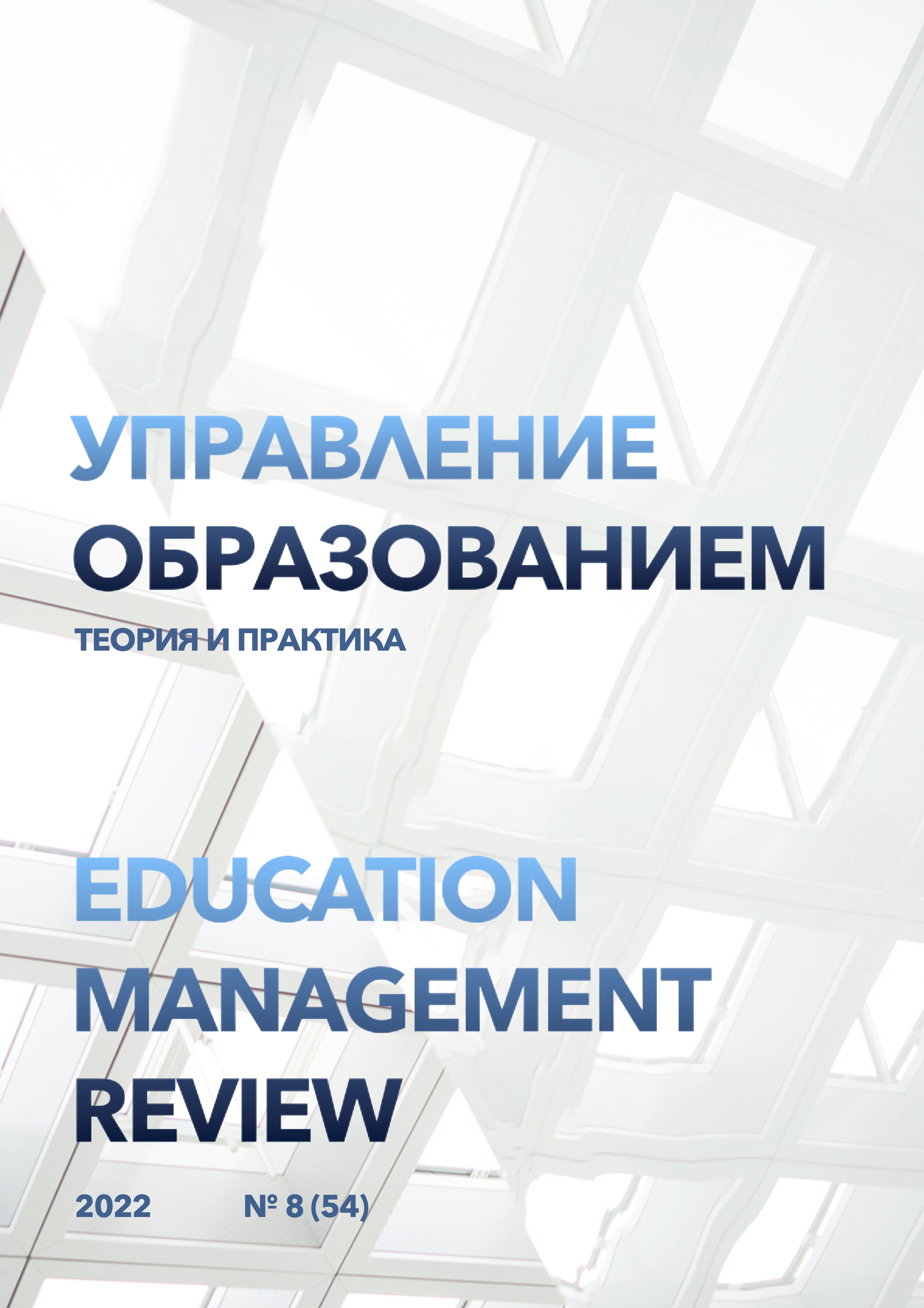Cognitive linguistics in foreign language learning
DOI:
https://doi.org/10.25726/k5151-9170-7289-xKeywords:
cognitive linguistics, foreign language, digital technologies, cognitive neurotechnologies, nature-like learning modelAbstract
The article is devoted to the study of the possibilities of applying cognitive linguistics technologies in teaching a foreign language in higher education. The author justifies the relevance and significance of the research topic through the ideas of a nature-like learning paradigm. It is concluded that modern foreign-language learning, since it includes a certain range of factors and necessary conditions for the formation of foreignlanguage communicative competence among students, therefore, the balance between the communicative and cognitive sides of the educational process becomes one of the key "loci" on the path of learning (mastering, using) a foreign language. Achieving such a balance, according to the author, can be achieved in the context of the use of cognitive neurotechnologies (artificial intelligence, virtual, augmented reality, machine learning, Big Data, Big Live Data, etc.). The thesis is substantiated that the use of these technologies for the purposes of foreign-language education makes it possible to form and create the potential for the development, firstly, of the ability of students to independently acquire new knowledge and acquire new skills and skills, both through memorization and through independent research or "discovery"; secondly, the ability to apply this knowledge and skills in practical activities to solve any life issues and problems (meta-skills); thirdly, the ability to use all acquired foreign-language competencies for further self-education and testing in professional activities. The main advantage of cognitive neurotechnologies, at the same time, remains the possibility of preserving the principle of consistency of consideration and knowledge of a foreign language and preserving its connection with the cognitive abilities of students in various forms of pedagogical interaction.
References
Беспалько В.П. Природосообразная педагогика. М.: Народное образование, 2008. 512 с.
Бим И.Л. Теория и практика обучения немецкому языку в средней школе: проблемы и перспективы. М.: Просвещение, 1988. 254 с.
Борисов Е.А. Преимущества, недостатки и перспективы развития системы дистанционного образования в Российской Федерации // Вестник Академии знаний. 2020. №4 (39). С. 115-118.
Ермолова Т.В., Савицкая Н.В., Дедова О.В., Гузова А.В. Аргументация выбора универсального инструментария обучения иностранным языкам в условиях перехода к digitalкомпетентностной парадигме // Science for Education Today. 2021. Т. 11. №6. С. 179-194
Зеер Э.Ф., Сыченко Ю.А. Журавлева Е.В. Нейротехнологии в профессиональном образовании: рефлексия их возможностей // Педагогическое образование в России. 2021. № 3. С. 8-15.
Мотов С.В. Особенности обучения иностранному языку на лингво-когнитивной основе в современных образовательных реалиях (на примере отрицания в английском языке) // Вестник ТГУ. 2021. №195. С. 50-59.
Семенова Г.В. Использование преимуществ технологии дополненной реальности в процессе обучения иностранному языку студентов неязыкового вуза // Педагогика. Вопросы теории и практики. 2020. №1. С. 128-133
Суворова Е.Ю. Образовательный потенциал дополненной реальности // Известия ВГПУ. 2021. №4 (157). С 30-35
Тарасов А.А. Формирование компетентностной основы иноязычной продуктивной письменной речи в начальной школе: дисс. ... канд. пед. наук: 13.00.02. – Москва, 2019. – 230 с.
Федотова М.А., Шевырев А.В. К вопросу о синтезе когнитивных и нейротехнологий (концепция и инструментарий) // Профессиональное образование и рынок труда. 2021. №4 (47). С. 88-97.
Хукаленко Ю.С. VR по-английски или как учить языки в виртуальной реальности. 25.04.2019 // Информбюро «Национальная технологическая инициатива». https://ntinews.ru/in_progress/likbez/vr-po-angliyski-ili-kak-uchit-yazyki-v-virtualnoy-realnosti.html
Хукаленко Ю.С. Обучение иностранным языкам (на примере английского) с помощью технологии виртуальной реальности: обзор основных разработок // Известия Восточного института. 2021. №2 (50). С. 118-128
Шифрон-Борейко И. Влияние когнитивных стилей на выбор стратегий овладения и пользования языком // Известия ВГПУ. 2021. №3 (156). С. 72-77.
Щепилова А.В. Теория и методика обучения французскому языку как второму иностранному. – М.: Гуманитар. изд. центр «ВЛАДОС», 2005. 245 с.
Alam M.A., Hasan M., Faiyaz I.H., Bhuiyan A., Joy S.F., Islam S.M. Augmented Reality Education System in Developing Countries // Electronic imaging. 2019. №183. 11 p.
Albanese M. The neuro-docimological challenge: Critical issues and possible tools // Education Sciences & Society – Open Access. 2021. Vol. 12(2). P. 124-131.
Apakina L.V., Denisenko V.N., Denisenko A.V., Chistyakov A.V., Zetkina A.V. Neurodidactics in foreign languages teaching (for example in Russian as a foreign language) // J Adv Pharm Edu Res. 2020. Vol. 10(1). P. 203-206.
Barbosa E.Y. A Neurodidactic Model for Teaching Elementary EFL Students in a College Context // English Language Teaching. 2021. Vol. 14(3). P. 42-58
Cearon F. I., Feltes H. Neuroscience role in the foreign language teaching and learning // Ciências e Cognição. 2020. Vol. 25. P. 043-060.
Findikoglu F., Ilhan D. Advocating Communicative Language Teaching for Too Long Now: The Inevitability of Grammar Translation Method and a Balance Between CLT and GTM in Instructional Settings // The International Journal of Educational Researchers. 2016. Vol. 7. P. 14-24.
Hong S.B., Park J., Moon Y., Grandmason M.L., Nowroski D.P., Moon M. Learning a Foreign Language in Adulthood using Principles of Neuroscience. ARC Journal of Neuroscience. 2017. Vol. 2(1). P. 11-14.
Li M. An Immersive Context Teaching Method for College English Based on Artificial Intelligence and Machine Learning in Virtual Reality Technology // Mobile Information Systems 2021. P. 7.
Pinto R.D., B. Peixoto, M. Melo, L. Cabral, Bessa M. Foreign Language Learning Gamification Using Virtual Reality – A Systematic Review of Empirical Research // Educ. Sci. 2021. №11. С. 222-229
Thompson G. Some misconception about communicative language teaching // ELT Journal. 2011. Vol. 50 (1). P. 9-15.
Zhao X., Yang Y. A Study on the Application of Blended Teaching to English Reading Course under the Background of Artificial Intelligence // IOP Conf. Ser.: Earth Environ. Sci. 2021. Vol. 693: 012019.




